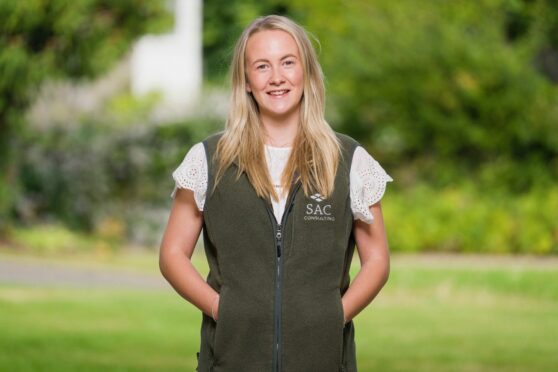A farmer’s daughter from Logie Coldstone in Aberdeenshire is the recipient of this year’s Norvite Scholarship.
The award was established in 2013 as legacy of the animal feed and nutrition’s 40th anniversary.
Shannon Farquhar who hails from Kinaldie Farm, completed her BSc (honours) at SRUC’s Aberdeen Campsus and graduated with a first class honours degree in agriculture.
Ms Farquhar also received the Malcolm Castle Memorial Prize for the best honours dissertation for agriculture.
Her dissertation was completed by using carbon audits from over 820 suckler farms across Scotland, splitting herds based on location and calving period.
She said: “Coming from a family farm which runs 180 suckler cows and completing carbon audits though the suckler beef support scheme, I was curious find out if there was significant variation within the industry.
“Across all farms enteric fermentation (a natural process that occurs when cattle digest their feed in the rumen) was found to be the largest contributing factor. When the data set was split by location it was found that hill suckler herds produced significantly more carbon per weight of output.”
Ms Farquhar said when she investigated this further, factors which influenced these systems included reduced purchased concentrates feeds which may have resulted in a slower finishing and growth period.
“Overall, output may also have been affected by pasture quality, herd genetics, herd health and overall management. However, the carbon output figures do not express the vital part that hill systems play in producing a high-quality protein source from significantly poorer quality forages,” she added.
“In terms of the future of reducing emissions from cattle, novel feed additives which reduce methane provide an exciting opportunity for the industry. I hope that with new feeds and improved management that beef farming can be viewed as a positive method of food production as opposed to a problem.”
Norvite’s technical director David McClelland said: “The work Shannon has done with Agrecalc could not be more topical, as agriculture faces the challenge of addressing our carbon emissions.
“Shannon’s focus on the Scottish suckler herd is very relevant as this forms a pillar of Scottish agriculture and is significant to Norvite’s business. Measuring and understanding our greenhouse gas emissions is the first step towards managing our impact and reaching mandated Net Zero targets.”
SRUC’s honours project coordinator at Aberdeen Dr Alex Hilton said Ms Farquhar’s results will help provide improved advice to farmers trying to reduce their carbon footprints.
“Industry-lead projects like Shannon’s are really helpful in developing a student’s professional skills as well as providing links with potential employers,” he said.
“This term, fourth year students on the Agriculture, Animal Science and Rural Business Management will have the opportunity to submit a proposal to Norvite. The winner will receive a financial prize but also receive valuable advice, support and industry insight from staff at Norvite.”
